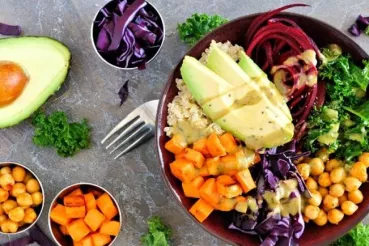As the triple threat of flu, respiratory syncytial virus (RSV) and COVID-19 looms this season, you may be wondering what you can do to boost your immune system to help fight these viruses and other common illnesses.
One of the most important actions you can take is to eat a healthy, well-balanced diet that contains the immune-boosting nutrients your body needs.
“When you eat a nutrient-dense diet, your immune system can perform more like a well-oiled machine that will allow you to better take any hit from a virus or cold,” says Kristin Gustashaw, MS, RDN, LDN, CSG, clinical dietitian and nutrition consultant at Rush University Medical Center.
However, an unbalanced diet can lead to nutritional deficiencies that affect how well that machine can work to defend your body against illness. So, how do we make sure we’re addressing or avoiding these deficiencies?
Beyond vitamin C, which many people recognize has immune-boosting benefits, here are some lesser-known nutrients that can help boost your immunity.
Zinc and copper: Finding the right balance
Zinc is often lauded for its ability to help fight off illness. But there is a downside: Taking zinc supplements for an extended time can cause more harm than good.
Specifically, getting too much zinc can affect how your body absorbs the mineral copper, another vital nutrient. Without enough copper, a person can develop a range of problems, from bone loss to fatigue to memory issues. “Too much zinc may be especially problematic for older adults, who are more likely to be deficient in copper,” Gustashaw says.
If you are younger than 50, you probably can get all the zinc you need by simply incorporating foods like red meat, poultry, beans, nuts, whole grains and breakfast cereals with added zinc into your regular diet. But if you are older than 50, you might benefit from a multivitamin formulated for your age group. “Vitamins made for older adults tend to have both zinc and copper, whereas some of the standard vitamins don’t,” she says.
Vitamin D: Critical for every cell
Another important factor in maintaining a strong immune system is vitamin D. “Nearly every cell in your body has a receptor for vitamin D,” Gustashaw says. “So, it’s not only important for the immune system but also a multitude of functions.”
Finding adequate vitamin D in foods can be tricky. You could try orange juice with added vitamin D. If you aren’t sensitive to dairy, you can opt for cow’s milk. But not all dairy products are good sources — yogurt, for example, doesn’t always have a lot of vitamin D, if any, Gustashaw says.
In sunnier months, most people can make adequate amounts of vitamin D by spending 10 to 15 minutes in the sunlight. But now that Daylight Saving Time has ended and people are spending less time outside in Illinois and other parts of the country, they may be more likely to develop vitamin D deficiencies.
Because there’s a connection between vitamin D and health outcomes, it’s important to know if you have or are at risk for a vitamin D deficiency. Your primary care doctor can order a test to check your levels and, if necessary, suggest a supplement.
Selenium: A reason to go nuts
Getting enough selenium in your diet can help your immune system work more effectively to protect against viruses and other invaders. Gustashaw recommends choosing selenium-rich foods like nuts, sunflower seeds, fish, meat and beans.
With colder weather ahead, a bean-rich chili might be just what your body needs to warm up and fight off illness, she suggests.
Probiotics: The pros and cons
Probiotics have become a hot topic among people interested in restoring the “good” bacteria in their gut and digestive system, and in turn, building a strong immune response. While foods like yogurt, cream cheese, kombucha and sauerkraut can provide natural forms of probiotics, the supplements in pill form pose a bigger challenge.
“It is important to remember that supplements are not as tightly regulated as food,” says Gustashaw. “The quality and quantity of the bacteria listed on the bottle may vary from bottle to bottle, and we don’t know for sure what kind of microbiome people are deficient in. If you are taking an over-the-counter probiotic, it should be a well-vetted one, possibly suggested by your provider.”
The bottom line for most: Choose better food over supplements
In general, Gustashaw recommends eating a diet rich in vegetables, nuts, seeds, fruit, whole grains and minimally processed meats and oils — all high-nutrient value foods that can boost your immune system. You can also talk to your doctor and a registered dietitian nutritionist about which diet, supplements or lifestyle changes can help you best prevent future ailments.
She also cautions against taking herbal supplements, including products advertised on social media, which often lack evidence to back up their claims.
“It’s better to buy nutritious foods than waste your money on those supplements,” she says.
Want some help building a healthy diet that helps strengthen your immune system? Dietitians at RUSH can help.




